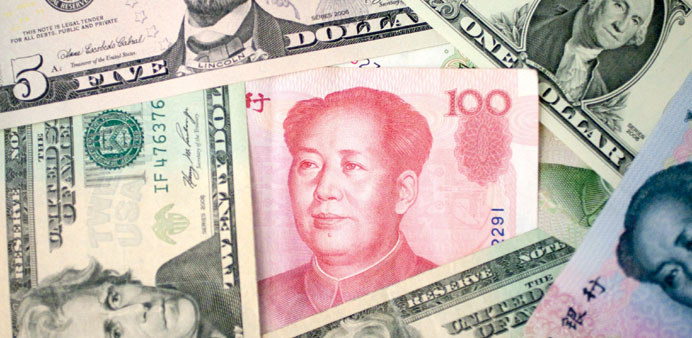The popularity of foreign currency — in particular the Chinese yuan — is problematic for the North Korean authorities, who are concerned at the possible rise of a second-tier economy over which they have little control.
AFP/Pyongyang
|
|
Chinese yuan, US dollars, euros and tea bags. Money can come in many forms in North Korea, but as a foreign visitor you’ll probably never even see a local banknote, let alone use one.
Pretty much any hard currency is welcome in a country with anaemic foreign reserves. Tourists, although few in number, represent a valuable cash source.
For those who do choose to visit, every transaction — no matter how small — must be made in foreign exchange, further narrowing options in what is already among the most restrictive countries in the world.
There are not many places to spend money in the capital Pyongyang. As a foreigner, the choice is reduced further by the need to find somewhere that accepts foreign currency and — importantly — is capable of giving change.
This is not such a problem in the large hotels and restaurants that cater to foreigners, but elsewhere it can get complicated.
Goods and services are mostly quoted in Korean won, so any purchase must begin by converting into the preferred currency of payment.
US dollars and euros are widely accepted but not always widely available, so change is often given in the most popular foreign currency, Chinese yuan, requiring a further conversion.
If the amount of change is negligible, a tea bag or two is often tendered as a substitute.
The only appearance of the Korean won is in the price list. Otherwise it is almost totally invisible.
Reports suggest that it is not particularly popular with North Koreans either.
There are varying estimates on the amount of hard currency in circulation, but some analysts in South Korea put it as high as $2bn.
This in a country with a Gross National Income of less than $30bn — which is equivalent to just 2.6% of South Korea’s GNI estimated at $1.15tn.
Public faith in the local currency was shattered following a disastrous revaluation implemented in 2009 in a backlash against emerging private markets that wiped out personal savings and triggered rare public protests.
The popularity of foreign currency — in particular the Chinese yuan — is problematic for the authorities, who are concerned at the possible rise of a second-tier economy over which they have little control.
In the Rak Won Department store, next door to the ticket office of the national carrier Koryo Air, staff easily outnumber the shoppers.
The products, spread thinly over two floors, range from a long shelf full of cheap Chinese candy to luxury imported goods that include foreign liquor and unlikely items like top-range German Wusthof chef’s knives.
The prices are clearly prohibitive to ordinary North Koreans and the staff’s insouciance at the arrival of a small team of overseas journalists with cameras and video equipment suggested that foreign customers were not the exception.
Further arm-twisting resulted in a hurried visit to the much larger and far more popular Kwang Bok department store, where escalators moved shoppers across three floors built around a central atrium decorated with national flag bunting.
The store was crowded with Sunday shoppers, and had a canteen serving duck, crab and fish that was obviously popular with couples and family groups.
There was a queue for a counter serving various kinds of beverages, and dispensed by a cashier sitting under a television screen showing a Korean War movie.
On the third floor, a children’s play area with plastic slides and climbing frames, was ringed by a skirting board with coloured illustrations of armed soldiers, tanks and fighter planes.
According to the World Food Programme, around two thirds of the nation’s 24mn population are still chronically food insecure.

